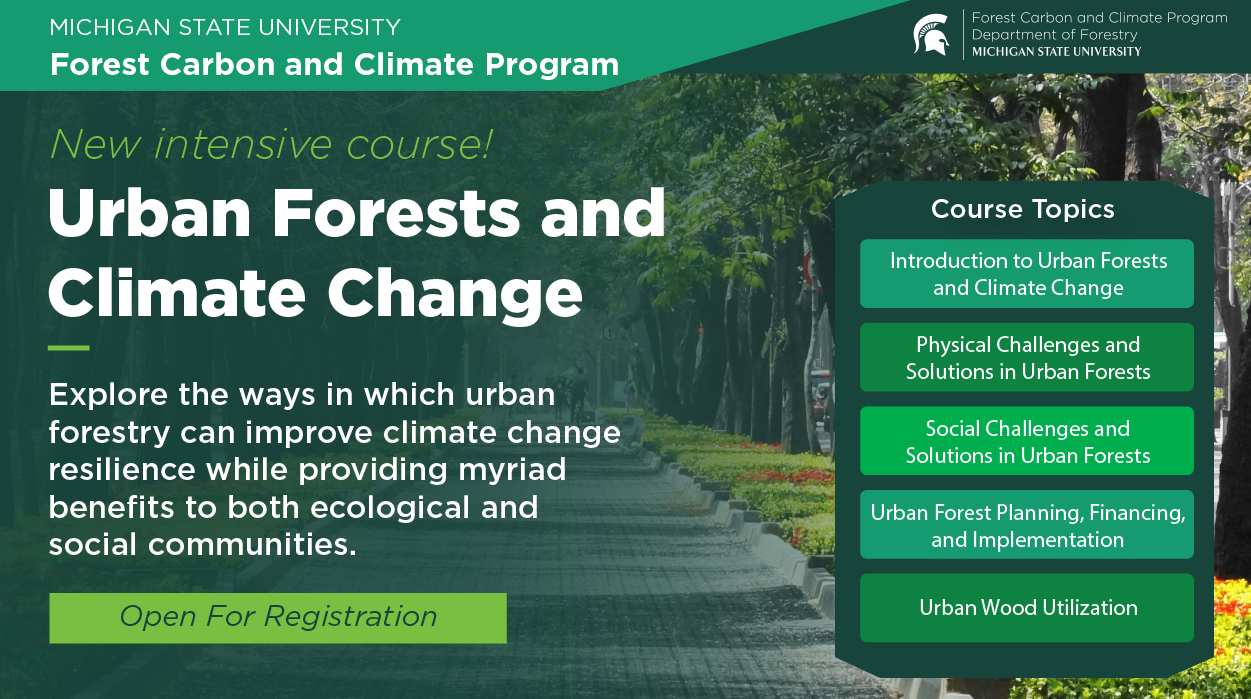Urban Forests and Climate Change

Urban Forests and Climate Change explores the ways in which urban forestry can improve climate change resilience while providing myriad benefits to both ecological and social communities. Learners will gain a comprehensive understanding of the roles urban forest management and sustainable wood construction play in climate change mitigation, highlighting key obstacles and opportunities specific to urban and municipal-level forestry. The course identifies unique themes and addresses the ways in which urban forests can be impacted by climate change as well as how management can be used as a tool to reduce social inequities, improve human health and well-being, and reduce environmental and community vulnerability to climate-induced stressors.
This course includes the following learning topics:
- Introduction to Urban Forests, Carbon, and Climate Change: Overview of urban forest definitions, characteristics, carbon dynamics, and key challenges
- Physical Challenges and Solutions in Urban Forests: Climate change impacts and adaptive management solutions to address key challenges related to environmental health of urban forest systems
- Social Challenges and Solutions in Urban Forests: Anthropogenic impacts and adaptive management solutions to address key challenges related to community health, equity, and access to urban forest systems
- Urban Forest Planning, Financing, and Implementation: Common tools and activities that account for climate mitigation and enhanced social equity in urban forest planning and implementation processes, with a review of various case study examples
- Urban Wood Utilization: Overview of wood dynamics and uses in the urban environment including waste and emissions, wood use supply chains, and mass timber construction
Recommended Prerequisite:
Some knowledge of forestry and/or forest carbon science will be helpful for this learning experience. While it is possible to take this intensive course separately, we recommend it as a supplement to one of the following programs:
- Understanding Forest Carbon Management
- Graduate Certificate in Forest Carbon Science, Policy, and Management
Course Collaborators:
This course is offered by the Michigan State University Department of Forestry Forest Carbon and Climate Program (FCCP). Course content was co-developed with MSU faculty as well as the Northern Institute of Applied Climate Science (NIACS), a collaborative, multi-institutional partnership led by the USDA Forest Service. Course development was made possible through funding from the Sustainable Forestry Initiative (SFI), American Forests, and the USDA Forest Service Eastern Region State, Private, and Tribal Forestry.
Dates:
This course is offered three times per year according to the schedule below. Participants can register at any time, but we recommend busy professionals give themselves 2-3 weeks to complete the course. The course must be completed during the access window.
- January 9 – April 9
- May 9 – August 9
- September 9 – December 9
Cost:
- $300
- View discount eligibility on the course policy page
Location:
- Online
Time Required:
- 5-7 hours
- Self-paced
Intended Audience:
- Forest managers
- Policy actors
- Urban planners
- Extension agents
- All interested individuals are invited to participate
Additional Certifications:
SAF: This course is approved for 5 Category 1 CFE hours.
ISA: This course is approved by ISA for CEUs in the following categories: ISA Certified Arborist (5), Management (5), Municipal Specialist (5).
More Information:
Email forestc@msu.edu for more information.
Subscribe to our newsletter to stay up to date on course offerings.



 Print
Print Email
Email